Annuals are the eye candy of the summer garden. If you're not already shopping for them, we're betting you will be soon. Who can resist all of those racks and tables maxed out with instant color. Fanciful visions of cascading window boxes, edge-spilling containers, and hanging baskets. Plus blank spots instantly filled in. It’s magic time! And every year, you get to create a whole new “plant painting” without breaking the bank.
Before you head to the garden center, here's a quick cheat sheet of a few annuals you'll likely see there. Plus ideas about how to use them. Which ones spark your creativity? Are there others that you love?
What are “annuals”?
They’re plants that complete their life cycle in a single growing season. If you live in a zone that experiences a fall killing frost, when they’re done, they’re done. In the warmest zones, some annuals can winter over.
FULL SUN
Many of the annuals we love to use for summer color originated in warmer climates. For instance, the southern United States, Mexico, and South America. That’s why (with a bit of care) they sail through the heat of summer, even in full sun. Here are just six of the amazing variety of full sun annuals you’ll find in stores this summer. We chose these for their chameleon-like ability to work in just about any design scheme.
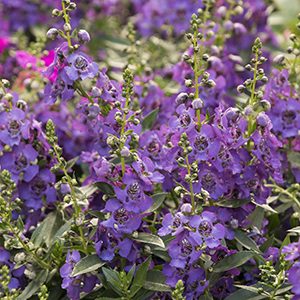
Summer Snapdragon
Angelonia is a heat-lover that’s perfect for upright, spiky interest. Mix the rainbow of colors–white, pink, purple, rose, red–or mass in a single hue. Deer and rabbit resistant! Up 14″ tall and wide.
Ideas: Hummingbird gardens, cottage planters, rose gardens.
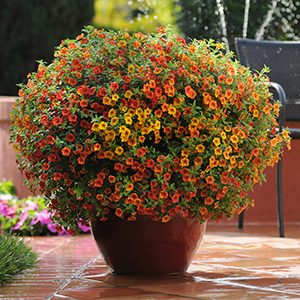
Million Bells
Calibrachoa’s petunia-like blooms are a billowy mass of color that thrive all summer, even in heat and humidity. Great in pots, but also a excellent, unexpected bedding plant. Up to 15″ tall and wide.
Ideas: Suspend hanging baskets in groups of three at different heights.
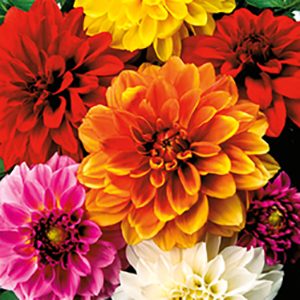
Dahlia
Happy and carefree, bedding and bush dahlias are shorter and more compact. They serve up ultra-bright, all-season color to borders and beds, but also as cut flowers. Up to 18″ tall and wide.
Ideas: Adds height to window boxes. Harvest when blooms are almost fully open.
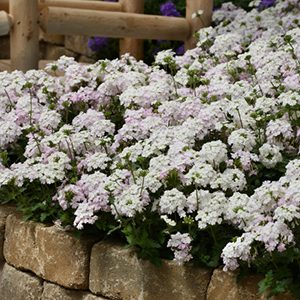
Verbena
When it comes to quickly softening hard surfaces or covering bare spots, few annuals do it better than verbena. Pillow-y and spill-y, it’s a spreading low grower. Butterflies go nuts for it. Up to 8″ tall and 3′ wide.
Ideas: Hanging baskets, of course, but also gentle slopes and berms.
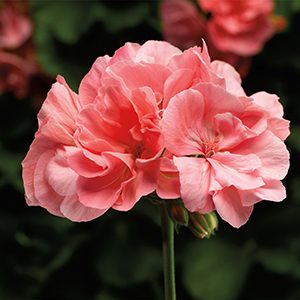
Geranium
Pelargonium (annual geraniums) are THE classic choice for containers and window boxes. Sun and heat lovers, they also tolerate partial shade. And the colors!! Up to 16″ tall and 24″ wide.
Use: Juxtapose it’s formality by planting in a blowsy cottage garden.
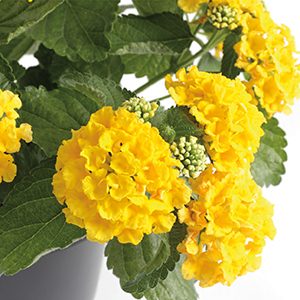
Lantana
Continuous summer color from large flower clusters on a compact, waterwise, sun-loving plant that tolerates heat and humidity. Perennial in mild winter region, annual elsewhere. Up to 16″ tall and wide.
Ideas: Use in wildlife gardens to attract bees and butterflies.
PARTIAL TO FULL SHADE
While few bloom enthusiastically in very deep shade. There are many annuals that actually appreciate a respite from summer's direct, overhead rays, especially hot afternoon sun. When choosing plants for areas that are not full sun, it’s a good idea to observe before buying. Note the light conditions at 8 am, 11 am, 2 pm, and 4 pm. This will give you the best info on how much sun your spaces gets, and at what time of the day. These six annuals are a great place to start.
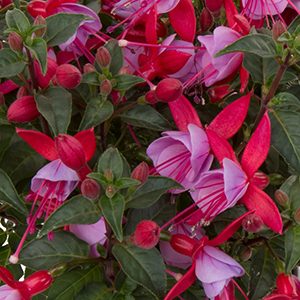
Fuchsia
A large family of flowering shrubs, several species are grown as frost tender container plants. These are so ideal for hanging baskets. Seriously, look at those drooping, tubular flowers! Up to 1′ tall and wide.
Ideas: Add tiny white lights to a hanging basket of fuchsia for a lush living chandelier.
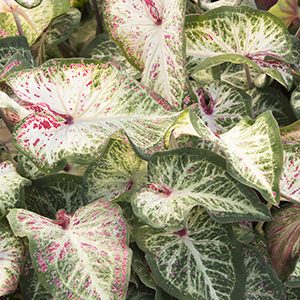
Caladium
Only difficult thing about Caladiums is deciding which to choose. Splotched, striped–choose one that makes you smile. Perennial in temperate, frost-free regions, annual elsewhere. Up to 18″ tall, 12″ wide.
Ideas: Use in low, trough planters where they can flutter in even a light breeze.
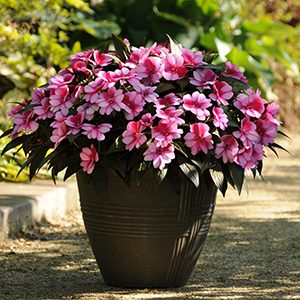
New Guinea Impatiens
Unlike classic impatiens, which are shade lovers. New Guinea impatiens flowers can tolerate up to half a day of sun in most parts of the country. Flowers are bigger, too. Up to 18″ tall, 9″ wide.
Ideas: Use where you need a carpet of near endless color. And, in butterfly gardens!

Coleus
Such a valuable color wonder for areas that seem to be on the damp side (but that drains well, too). Many colors and leaf shapes–you could become a collector. Pinch often! Up to 18″ tall and wide.
Ideas: Lovely massed, but also use them to contrast taller, grassy foliage plants.

Lobelia
There is almost no such thing as too much heat for Lobelia. Keep soil moist for full bloom throughout summer. One more bonus? Deer don’t love it, but bees do. Up to 12″ tall and wide.
Ideas: Trailing habit is perfect for porch or patio in hanging baskets or containers.

Sweet Potato Vine
A distant relative of the ‘Morning Glory’ vine, sweet potato vine–black, green, or brown– grows big and fast. Works in sleek modern settings, vegetable gardens, cottages. Trailing, 16″ tall and 24″ wide.
Ideas: Tie the long stem up onto a trellis for a quick, green screen.
KEEP THEM HEALTHY AND HAPPY!
- Choose carefully both in terms of light needs and watering requirements. Look for well branched, bushy plants, and then get them into the ground ASAP!
- Feed regularly (every 3 – 6 weeks) to keep them healthy and to ensure a near constant supply of blooms. Always make sure to water well before applying fertilizer (liquid or dry) to avoid shock.
- Annuals do not have very deep root systems and can dry out quickly on a hot day. Grab your coffee, grab a hose and give them a good, deep soaking in the morning. In the evening, grab a drink and do the same! Water whenever the soil feels dry about 1 inch below the surface.
- Pinch (use your thumb and forefinger) to remove spent flowers as needed. Many newer varieties are “self cleaning” so the flowers sort of disappear, but the stems will get leggy. Around midsummer, prune back by several inches. You’ll be rewarded with a fresh flush of new growth and flowers.
